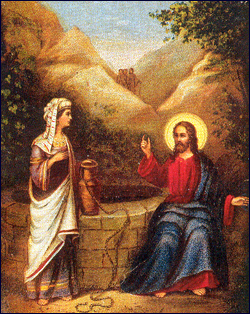
The Samaritan woman speaks with the Lord |
The Gospel tells us of how the Lord Jesus Christ once came to a city in Samaria called Sychar, where there was a well given by Jacob to his son Joseph and his descendants. Fatigued by His journey, the Lord providentially sat down to rest at this well, while His disciples went into town to buy some provisions. At that moment a woman from that town came to the well to draw water. The Lord asked her to give Him to drink. The woman was surprised by the request, since the Jews had no dealings with the Samaritans. Jesus said to her: if only you knew with Whom you are talking, you would ask Him to give you to drink, and He would give you living water. The woman of Samaria was even further bewildered, thinking of how Jesus could give her living water, not even having anything with which to draw the water.
|
|
The Lord then told her that those who drank water from the well would thirst again, while the water which He gave would become a source of everlasting life. By living water the Lord meant His life-giving teaching, which leads to eternal bliss in the Heavenly Kingdom. After that the Lord, knowing that the woman of Samaria, though secretly living in sin, nevertheless had an ardent faith in God and a firm expectation of the coming of the Messiah, gradually revealed to her that it was He, the One talking to her, Who was the long-awaited Christ. Then the woman of Samaria joyously threw down her pitcher and ran to the city to invite her fellow-citizens to come out to meet Christ, and by her testimony many Samaritans came to believe in Him.
This blessed woman of Samaria, who had the great fortune to talk with the Lord, was later martyred for Christ, together with her sons and her sisters, during the persecution of Christians by the Roman Emperor Nero. This persecution lasted from 65 to 68 A.D., and it was during those years that the holy apostles Peter and Paul were martyred in Rome, after which the persecutors began to search for their followers. At that time St. Photina was living in the city of Carthage (the modern Tunis), where, together with her younger son Josiah, she fearlessly preached the Gospel, while her older son Victor was in the Roman army which was fighting against the barbarians. After the war Victor was appointed military commander of the city of Attalia, where he was instrumental in converting many people to Christianity, including the ruler of the city, Sebastian.
When Nero was informed that Victor and Sebastian were preaching the faith of Peter and Paul in Attalia and converting many to Christianity, and that the same was being done in Carthage by Photina and Josiah, who had been sent there by the holy apostles, – the Emperor became greatly incensed and ordered everyone to come to Rome to be tried. Photina arrived in Rome accompanied by many Christians, including her five sisters – Anastasia, Photo, Photida, Paraskeva, and Kyriakia; they all awaited martyrdom, of which they had been told in advance by the Lord Jesus Christ, Who had appeared to them Himself. Nero ordered all of them to be brutally tortured, especially St. Photina, but by the grace of God they did not feel any pain and remained unharmed. Then the Emperor, not knowing what else to do with them, ordered Victor, Josiah, and Sebastian to be blinded and thrown into prison together with Photina and her sisters.
The holy martyrs spent three years in prison. At a certain moment Nero remembered them and sent his servants to check on them. Returning from the prison, the servants reported to the Emperor that the blinded Galileans were seeing again and were completely well, that the prison itself was full of light and a wondrous fragrance, that instead of a place of imprisonment it had become a holy place for the glorification of God, and that many people gathered to see the saints and be baptized by them. Hearing all this, Nero was filled with fear and wrath, and ordered the holy men to be crucified upside down and beaten with straps until their bodies fell apart, which was duly executed, and then left to hang for three days. On the fourth day the Emperor’s servants came to check whether the martyrs were still alive, and finding them very much alive, the servants suddenly became blind. At that moment an angel of God came down from heaven, untied the martyrs, and made them completely well. Then the saints prayed over the blinded servants and the latter saw again, and immediately believed in Christ. They were then baptized and become followers of the holy martyrs.
When Nero found out about this, he was filled with great rage and called Photina to the tribunal, where he ordered her to be skinned and thrown into a deep and slimy well. Then the Emperor ordered her five sisters to be brought before him and also skinned, after which he ordered all the martyrs to be beheaded. St. Photina was brought out of the well and tortured again at great length, and urged to make a sacrifice to the idols, but Photina spit in the Emperor’s face and laughed at him, for which she was again thrown into the well, where she finally gave up her soul to God.
|